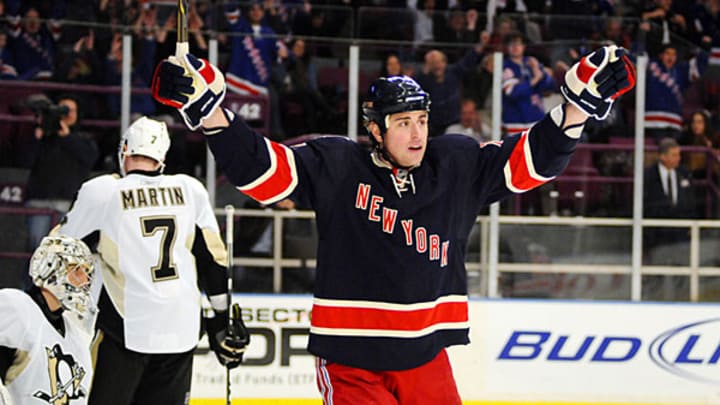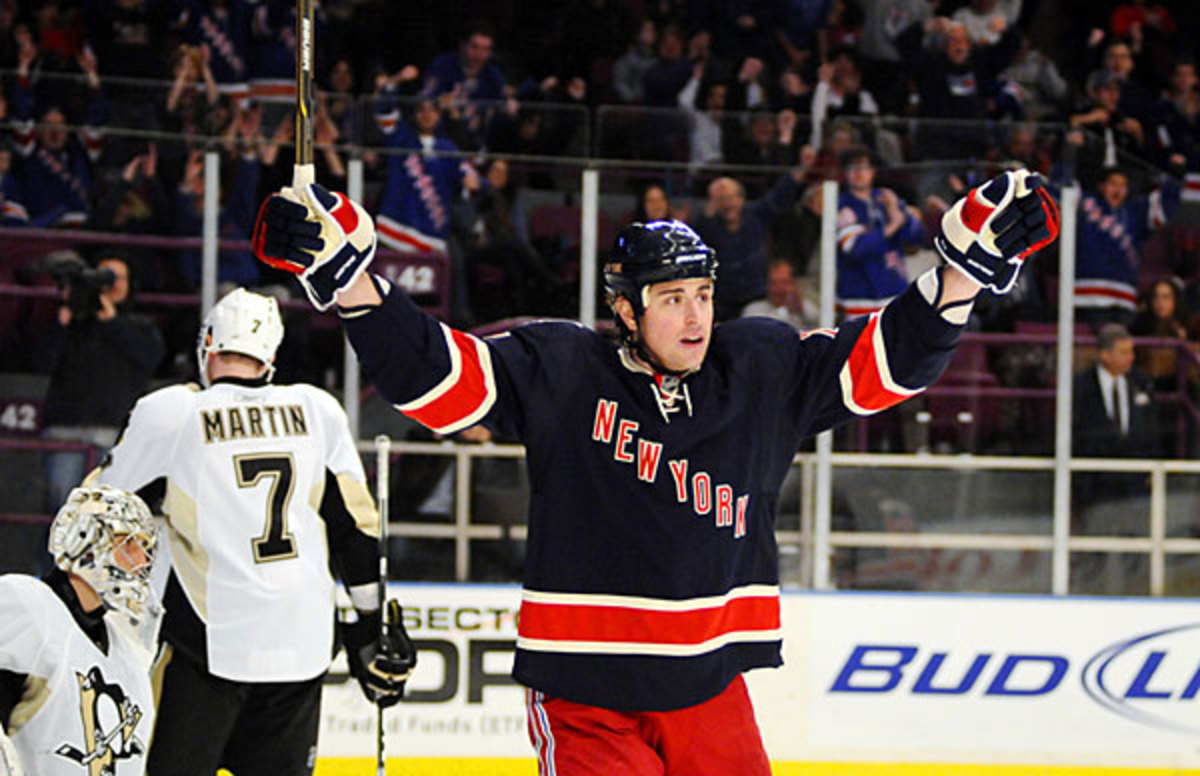Avoiding arbitration is NHL's preferred path

The Rangers avoided having to disparage Brandon Dubinsky, who led the team in scoring last season, by agreeing to a new contract hours before their salary arbitration hearing. (Bennett Cohen/Icon SMI)

By Stu Hackel
It's salary arbitration time in the NHL, one of the most complicated and often anti-climactic periods of the offseason.
The first of hearings took place on Wednesday when defenseman Chris Campoli was awarded $2.5 million for next season. But the Blackhawks walked away from the award, which they indicated they would do when the sides couldn't reach a negotiated settlement last week and signed free agent defenseman Sami Lepisto instead for $750,000, substantially less than the $2.75 million Campoli was reportedly seeking. So Campoli is now an unrestricted free agent.
For Blackhawks fans, the lingering image of Campoli will be his turnover in overtime of Game 7 of the opening round against Vancouver in April that led to Alex Burrows' series-winning goal...
...but Hawks GM Stan Bowman was anything but critical of Campoli's performance for Chicago last season. “It was apparent from the beginning that their salary demands were just not in concert with where we see him fitting in with our team,” Bowman said (quoted in The Arlington Daily Herald) after negotiations failed. “He obviously played well for us in the short time he was here and we wanted to bring him back, but it didn't work for him. He sees himself in a different category than we did price-wise.”
The rest of the arbitration hearings thus far have all been avoided. The most recent dodge came when the Rangers and their top scorer Brandon Dubinsky agreed on a four-year deal reportedly worth $16.8 million. His hearing was scheduled for today. Two hearings had been set for Wednesday, but last-minute agreements between the Lightning and Teddy Purcell and the Coyotes and Lauri Korpikoski made them unnecessary, too.
The next scheduled hearings are next week when the Canadiens and defenseman Josh Gorges are slated to debate his worth in front of an arbitrator as are the Rangers and sparkplug forward Ryan Callahan. No doubt, they'll be working hard to reach a deal before then.
The two most interesting cases are set for early August between Shea Weber and the Predators and Zach Parise and the Devils. In each, the team filed for arbitration, which guarantees the players in question will remain with their teams for one more year and prevents an RFA offer sheet from another club. The Devils and Predators continue to negotiate with core players who are considered essential to each club's future.
The reality of going to the hearing often accelerates negotiations because, generally, teams and players want to avoid arbitration. For one thing, the process is fraught with unknowns. The team presents a proposed salary, the player presents another and the arbitrator can choose either or any figure in between. (Here's a short blog post about evidence that is and is not admissible in a hearing and some other basic rules, and a good one that's a little more detailed and recent.) If the team doesn't like the result, it can walk away from the award in some cases (provided the player, not the club, had filed for arbitration, and it was for a one-year deal, among other limitations). The player can then elect to become an unrestricted free agent. So there are lots of complexities and unpredictable variables here. No one in hockey especially likes complexities and unknowns, not even the lawyers.
Equally important in why everyone is wary of arbitration is that the hearings can be fairly contentious with the club arguing why the player is not worthy of the money he is requesting. No team really wants to make disparaging remarks about a player it also wants on its roster. That can be damaging to the player's confidence or erode his trust in the organization.
Probably the most famous case of that came in 1997 when Islanders goalie Tommy Salo filed for arbitration. He was 25, had just finished his first full NHL season, and had become the Isles' Number 1 goalie, posting some good stats for a last place club in the seven-team Atlantic Division. As related by former Islander beat writers Peter Botte and Alan Hahn in their book Fishsticks, Salo was a sensitive guy who didn't handle criticism well and his agents didn't adequately prepare him for the potentially contentious nature of the hearing.
Sure enough, Isles GM Mike Milbury (who. as TV viewers know, has all the sensitivity of a gravel road and for whom criticism is a raison d'etre) testified as to the goalie's conditioning, or lack thereof, and made remarks so critical of Salo that the netminder broke down and began crying, forcing his agent to ask for a break in the hearing so he could regain his composure. The relationship between the goalie and GM, which wasn't strong to begin with, deteriorated irreparably from there and Milbury eventually traded Salo to Edmonton where he, like a few others Milbury traded, became a star.
That cautionary tale still haunts the arbitration process. In his coverage of the preparations for the Dubinsky hearing, Larry Brooks of The New York Post reported that the Rangers were planning on having a lawyer present their case, not GM Glen Sather (who wasn't going to attend) or assistant GM Jeff Gorton, in hope of distancing the team from any critical remarks that were made about Dubi.
But it doesn't matter now and avoiding the process is the way most of the 22 arbitration cases filed this summer will go. Better that than uttering nasty words or having to walk away from an award.
